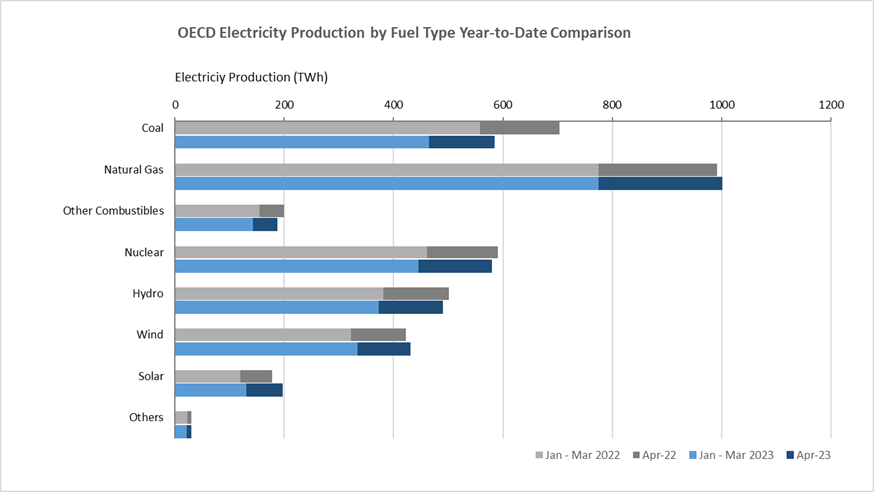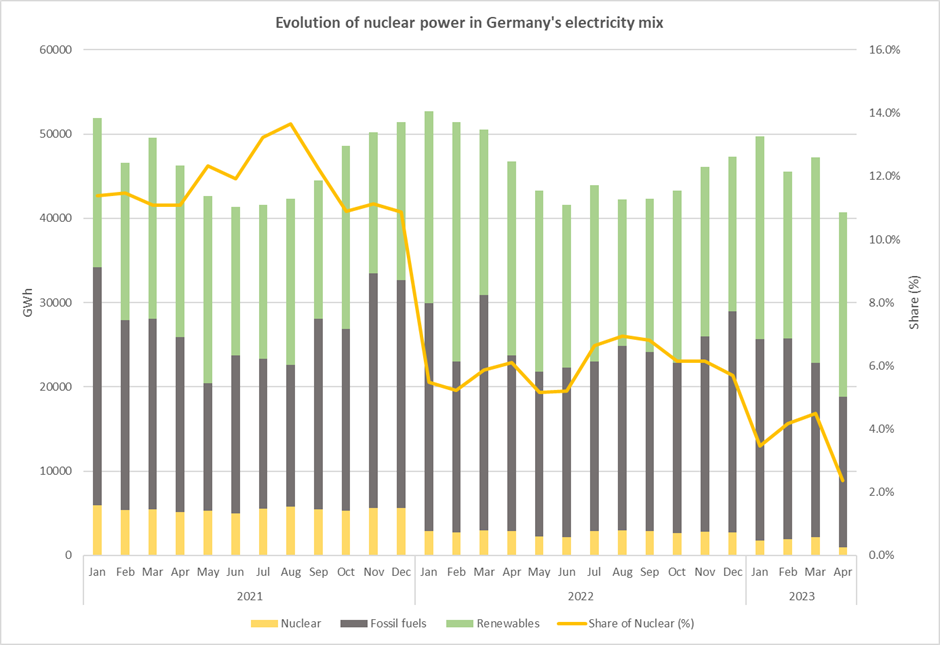IEA – Monthly Electricity Statistics
The latest IEA’s Monthly Electricity Statistics report including April 2023 data shows that for Total OECD:
In the OECD, total net electricity generation was 803.4 TWh in April 2023, decreasing by -2.5% year-on-year. This decrease was driven by lower production from fossil fuel sources (-5.3% y-o-y), namely from coal fired plants (-18.1% y-o-y).
Renewable energy production also saw a slight decrease in April 2023 (-1.2% y-o-y), as lower precipitation in the recent months in North America impacted hydropower production, and lower wind speeds in the northern hemisphere resulted in lower wind power production.
Nuclear power, despite plant closures in OECD Europe, increased by 2.7% y-o-y in total OECD.

Highlight of the month:
In Germany, total net electricity was 40.8 TWh in April 2023, down by 13.0% y-o-y compared to the same month last year. Electricity production from nuclear declined by 66.3% y-o-y, reflecting the planned shutdown of the last three nuclear plants in mid-April, which marks the end of the nuclear era for Germany. Electricity production from fossil fuels declined by 14.6% y-o-y, mainly driven by coal (-21.1% y-o-y), and production from renewables by 4.8% y-o-y.

The IEA’s Monthly Electricity Statistics features electricity production and trade data for all OECD Member Countries and electricity production data for a selection of other economies. The latest dataset is available below in CSV.
We have now moved to a new integrated platform and in order to access data, all users will need to login using their IEA account. If you would like to access the data, please create your IEA account on this page. Once you are logged in, you can download the dataset here.
For more information on energy statistics, visit:
To sign up to additional IEA newsletters, visit our newsletter subscriptions page
SourceIEA
EMR Analysis
More information on IEA (International Energy Agency): https://www.iea.org + The IEA is at the heart of global dialogue on energy, providing authoritative analysis, data, policy recommendations, and real-world solutions to help countries provide secure and sustainable energy for all.
The IEA was created in 1974 to help co-ordinate a collective response to major disruptions in the supply of oil. While oil security this remains a key aspect of our work, the IEA has evolved and expanded significantly since its foundation.
Taking an all-fuels, all-technology approach, the IEA recommends policies that enhance the reliability, affordability and sustainability of energy. It examines the full spectrum issues including renewables, oil, gas and coal supply and demand, energy efficiency, clean energy technologies, electricity systems and markets, access to energy, demand-side management, and much more.
Since 2015, the IEA has opened its doors to major emerging countries to expand its global impact, and deepen cooperation in energy security, data and statistics, energy policy analysis, energy efficiency, and the growing use of clean energy technologies.
More information on Dr. Fatih Birol (Executive Director, International Energy Agency): https://www.iea.org/contributors/dr-fatih-birol
More information on OECD (Organisation for Economic Co-operation and Development): https://www.oecd.org + The OECD is an international organisation that works to build better policies for better lives. Our goal is to shape policies that foster prosperity, equality, opportunity and well-being for all. We draw on 60 years of experience and insights to better prepare the world of tomorrow.
Together with governments, policy makers and citizens, we work on establishing evidence-based international standards and finding solutions to a range of social, economic and environmental challenges. From improving economic performance and creating jobs to fostering strong education and fighting international tax evasion, we provide a unique forum and knowledge hub for data and analysis, exchange of experiences, best-practice sharing, and advice on public policies and international standard-setting.


